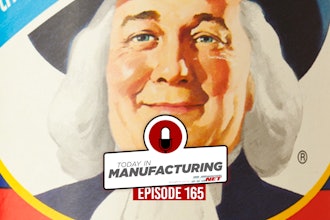By Mike Collins, author of Saving American Manufacturing
Last month, part one of this column outlined the disconnect between the skills that are required for the incoming workforce, and the training that is actually being conducted. Part two will outline how a focus on advanced apprentice training will improve the skills of the manufacturing workforce.
“Journeyman” is a good term to define the multiple skills needed to be a “highly-skilled” worker in any field of manufacturing, whether it be a pipe fitter, machinist, electrician, assembler, or maintenance and service worker.
There are some good programs at many community colleges that can train the new worker in fundamentals, but most of these two-year programs are the class-work subjects that prepare a new worker to enter an apprentice program. But the advanced training or apprentice-type training must be done on the job and the student must find a sponsoring company.
Support Programs Head To Pasture
In the 1970s, large companies like Kodak and Xerox used to support programs that employed hundreds of highly skilled apprentices. As these companies began downsizing and laying off thousands of employees, they also cut the apprentice programs. This was also true for big companies that were leaning out their companies and trying to reduce staff. Many journeyman programs require thousands of hours of education. For instance, the apprentice machining program at Ogden Technical College requires 900 hours of classroom education and 8,000 hours in on-the-job training at the company. As globalization closed in on them, the large companies began judging investments in training in terms of return on investment, and training programs that took too many hours were simply not justified and dropped.
You can see the evidence for this in the current data compiled by the Department of Labor. Of the 213,941 apprentices registered with the Federal government in 2001, only 9.8 percent of the apprentices were related to manufacturing industries. In 2009, the overall number of apprentices was up to 283,955, but the manufacturing apprentices had dropped to 6.6 percent of the total. In fact, the electrical and plumbing industries have more people being trained than all of the manufacturing industries combined. In other words, manufacturing employs about 12 million workers and is training 18,699 apprentices (as of 2009). Less then one percent of the total manufacturing workforce is getting formal advanced training in manufacturing.
Dumbing Down The Program
Journeymen in any trade are the truly advanced or “high-skilled” workers. But instead of investing in these kinds of long-term programs and paying the employee for the skills learned, the large companies are trying to get by with dumbing down the training materials. For instance, the OEMs who build the machines are asked to provide HMIs (human machine interfaces) and operation manuals that are dumbed down to an elementary school level. The idea is that you can teach a low-skilled worker how to operate, maintain, and troubleshoot complex machines by simply providing simplistic instructions with lots of pictures.
But from my experience, these approaches to training are not going to work and there are several reasons why manufacturers should abandon these simplistic efforts and focus on advanced (apprentice) training to improve the skills of the manufacturing workforce:
- The automated product lines and other equipment get more complicated every year.
- The low skill jobs are mostly gone (most eliminated by automation).
- The 10 million baby boomer employees that are going to retire by 2020 are very experienced and are going to be difficult to replace without advanced training.
- Running plants with fewer employees requires multi-skilled people who can do a variety of jobs everywhere in the plant.
- Most technical people I have known don’t learn from reading, they learn from doing because they are visual or “hands on” learners.
Are You Willing?
So what we've been reading is true: At a time of recession, with 2 million manufacturing workers laid off, we are faced with a shortage of the high skill workers that are needed in these plants. Instead of offering my conclusions, I will end this article by asking the Fortune 1000 manufacturers the questions I think are most pertinent to create the highly skilled jobs that are needed.
- Are you willing to make a compact with new workers that want to be trained for long term employment?
- Will the emphasis on high-skill training be considered a higher priority than layoffs and outsourcing?
- Will you promote high-skill training as a manufacturing career or just a job?
- If the employee invests in learning the advanced skills for these jobs, are you willing to pay them for their progress in skills and certifications?
- Are you willing to increase your training budget to three percent of sales, as has been the suggestion of several skills studies?
- Are you willing to change your ROI formulas to include the long term training requiring hundreds or thousands of hours with a long term payoff?
- Are you willing to use the old apprentice/journeyman standard as is done in Germany in place of short-term training?
I think the answer to most of these questions is going to be NO and the large corporations (particularly the publicly-held companies) will not fund any training that does not meet their ROI formulas -- regardless of their own research studies.
All of the skills studies and reports since 1990 make the point that the future of American manufacturing (if not the entire economy) rests on the skills and adaptability of the manufacturing workforce. But, the training of these people and the fate of manufacturing is a decision that is going to be decided by the large publicly held corporations. The old saying everyone would like to get into heaven but nobody wants to die to get there seems to be apropos. The large manufacturers want highly-skilled employees but they don’t want to make the investment to train them.






















